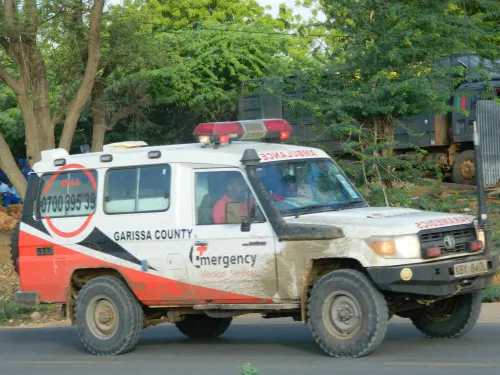Has Pakistan Established Camps for ISKP Terrorists to Target the Afghan Taliban?

Synopsis
Key Takeaways
- Pakistan has set up training camps for ISKP terrorists.
- Over 1,000 terrorists are being trained.
- There are concerns about attacks in Jammu and Kashmir.
- Collaboration between Pakistan and ISKP is increasing.
- Recruitment drives for ISKP might extend to India.
New Delhi, Oct 31 (NationPress) Pakistan has established four specialized camps aimed at training terrorists affiliated with the Islamic State in significant numbers, subsequently deploying them into Afghanistan to execute attacks. Analysts warn that Pakistan may gradually redirect some of these ISKP terrorists into Jammu and Kashmir.
As tensions with the Afghan Taliban have intensified, Pakistan and the Islamic State Khorasan Province (ISKP) have found common ground in their fight against a shared adversary.
The relationship between the Afghan Taliban and Pakistan has soured over the Durand Line, leading to rising hostilities.
In light of this, Pakistan has undertaken airstrikes within Afghanistan, prompting a strong response from the Taliban.
In recent months, there has been a surge in training camps within Pakistan specifically designed for ISKP operatives.
Intelligence Bureau officials report that the ISI aims to train over 1,000 ISKP terrorists with the clear objective of launching assaults against the Afghan Taliban.
Multiple forms of training are being provided, as noted by Indian intelligence agencies.
These terrorists are being instructed in ground combat to effectively challenge Taliban forces, with dedicated camps for suicide attackers also reported.
Additionally, it has been revealed that several current and former members of the Pakistan Army are actively involved in this training initiative.
Since its formation, the ISKP has engaged in a conflict with the Taliban, aiming to dismantle their regime and seize control of Afghanistan.
However, the ISKP has struggled to compete with the Taliban, thus seizing the opportunity presented by Pakistan's support.
Officials indicate that numerous ISKP operatives are being smuggled into Pakistan from Afghanistan, subsequently being transported to training facilities in Balochistan and the tribal regions of Khyber Pakhtunkhwa.
The capture of an individual named Mohammad by Afghan security forces corroborates claims that Pakistan has become a central hub for ISKP training.
This detainee revealed that he underwent ideological and combat training in Quetta, Pakistan. After entering Afghanistan using a fake ID, he indicated that the ISI had made substantial efforts to indoctrinate him.
While these terror camps are primarily focused on Afghanistan, officials caution that there could be broader implications for the entire region.
India remains a significant target for the ISKP, and in the coming months, the group may extend its operational reach beyond Afghanistan.
Initially, the ISKP's main goal was to defeat the Taliban, but the group has expressed ambitions to establish a Caliphate that includes India.
Moreover, the group has demonstrated particular interest in engaging in activities within Jammu and Kashmir.
Experts opine that Pakistan may gradually funnel ISKP terrorists into Jammu and Kashmir, believing that an additional militant faction alongside Jaish-e-Mohammad and Lashkar-e-Taiba would bolster their efforts.
Another concern for Indian security agencies is the potential for a recruitment initiative targeting individuals in India.
Historically, the ISKP has recruited Indians and trained them within Pakistan. The ISI is likely to seek new recruits from India to send to its camps in Pakistan for training.
Recent reports indicate that at least 21 individuals from Kerala have departed India to join the ISKP in Afghanistan, receiving training that prepares them to return to India and conduct terror attacks.









